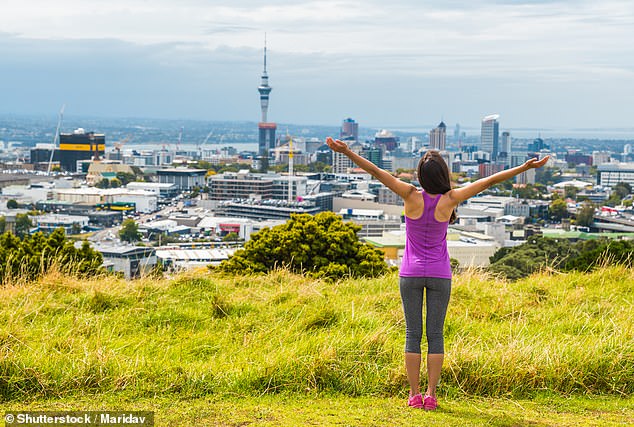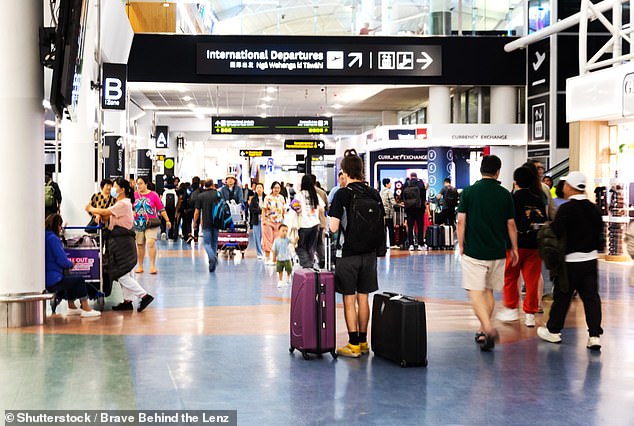- New Zealand to increase entry fee
- The price will increase to $92 AUD
Tourists visiting New Zealand will be charged a fee of NZ$100 to enter the country, in a move that industry groups say makes the country “one of the most expensive countries in the world to spend a holiday in”.
The International Visitor Levy (IVL) will rise from $NZ35 ($A32) to $NZ100 ($A92) from October, according to changes announced on Tuesday.
However, Australians and travellers from most Pacific nations are exempt from IVL.
Introduced in 2019, funds raised by the IVL are supposedly reinvested in tourism infrastructure and conservation projects to improve popular tourist destinations, with the intention of increasing tourist numbers.
“Increasing the IVL means we can continue to grow international tourism to support economic growth,” said Tourism Minister Matt Doocey.
‘(It ensures) that international visitors contribute to high-value conservation areas and projects, such as supporting biodiversity in national parks.’
The move follows a government effort to promote New Zealand as a destination for big-spending tourists rather than backpackers or the hated local “freedom campers” who travel in vans.
Freedom campers spend very little on local businesses, but increase the pressure around tourist attractions.
Tourists visiting New Zealand will be charged a fee of NZ$100, a move that industry groups say cements the country “as one of the most expensive countries in the world to holiday in” (pictured: travellers at Auckland International Airport)
An increase in the tax has been announced for months and the government’s budget predicted that it would go from 35 to 70 dollars.
Following the consultation, the government – which announced a budget deficit of NZ$13.4 billion (A$12.3 billion) in May – decided to implement a steeper increase, which is expected to generate an additional NZ$127 million to NZ$173 million (A$117 million to AU$159 million) for the coffers each year.
The government is also dramatically increasing fees for tourist visas, with the New Zealand Airports Association (NZAA) saying foreign arrivals would now pay between NZ$495 and NZ$625 ($454-$A573) just to enter the country when the visa, IVL, immigration fee and other charges are combined.
The visitor visa fee rose by 61 percent to NZ$341 (A$313).
NZAA chief executive Billie Moore said the increased costs for visitors were a “triple whammy” for the tourism sector.
“The government’s own modelling from just two years ago showed that a $100 border increase could reduce visitor demand by up to 2.61 per cent, or 101,000 visitors based on pre-pandemic levels,” he said.
The peak body for tourism in Aotearoa last month expressed disappointment at the rise in visitor visas and working holiday visas, which rose 59 percent to $NZ670 ($A615).

Australians and travellers from most Pacific nations are exempt from IVL (pictured, Auckland)
“We are particularly concerned about the cumulative effect of these fees, which we believe will have a material impact on visitor numbers, a vital workforce and the economic contributions they make,” said TIA CEO Rebecca Ingram.
More than 3.2 million tourists visited New Zealand last year, including 1.3 million Australians.
Major markets that will be affected by IVL include the United States, China, the United Kingdom, India, South Korea and Germany, which together accounted for one million tourists last year.
Mr Doocey said he hoped the fee increase would not affect tourist numbers as it would “typically represent less than three per cent of an international visitor’s total expenditure”.
“The new IVL remains competitive with countries such as Australia and the UK, and we are confident that New Zealand will continue to be considered an attractive tourist destination by many around the world,” he said.
The passenger movement charge in Australia, which has no exemptions based on nationality, was raised in July from $A60 to $A70.

